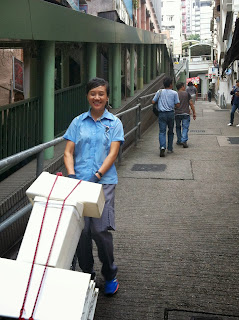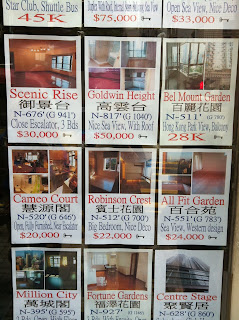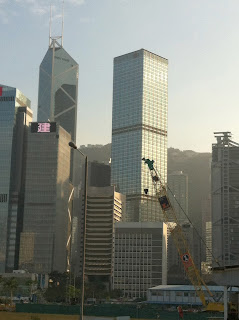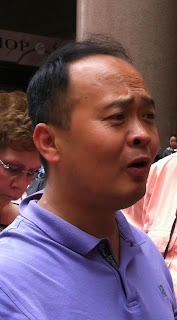After
a sashimi lunch I decided to spend my last afternoon in China just as I started this trip, at a Chinese garden.
Nan Lian is in Kowloon, the land across the Victoria
Harbor. I took the Star Ferry, in service since the mid-1800s when
the British took this area as spoils from the Opium War in 1840.
Do
you know the story of the Opium War? It's a terrible one. The
British public took to Chinese tea like mad and as a result the
balance of trade was heavily in China's favor: they informed the
British that England had nothing the Chinese wanted in trade. So the
British brought opium from India, their other prime colony, and
handed it out to the Chinese for free even though under Chinese law
it was illegal. Free for a while, of course; after that, when people
were good and addicted, they had to pay highly: opium was highly
profitable for the British. Eventually there was a war over it which
China lost, and this is how Hong Kong got to be British until 1997
when it was returned to China. In fact China has lost multiple
modern wars: to Japan before World War II, to its ally the Soviet Union in
World War II when the Soviet Union made China pay a huge amount of money for the
weapons that had supposedly been donated to them, and the Korean War with its
ally North Korea. Mike tells us all this matter-of-factly.
On
the ferry I had a conversation with a Trinidadian couple living in
Toronto. They were surprised to see me alone: “How brave of you!”
It is so interesting that this is such a common reaction. I
certainly don't feel brave, or not brave. Just normal. After all,
the test is: will you die here? Of course not. On my own in an
unfamiliar place in an unfamiliar language, everything will just take
longer and be inefficient. How awful can it be?
I
don't know what the humidity measured but it had to be 80 to 90
percent. Even though the temperature is in the 70's this is very
uncomfortable. On the way to the garden I saw many apartments with
laundry hanging out to dry, which is common in China, but here I can't
see how it dries.
I
was very happy to be in a garden again – green and with very few
people. I don't know which was more welcome. There were some mature
and beautiful bonsai trees.
This
woman was raking the sand into “ripples” around the rocks.
This
man was trimming the tree into cloud shapes.
But
it was really never possible to forget that these few acres of garden
were created out of a noisy, bustling city. The traffic noise was
loud everywhere.
This
garden also cannot compare with the gardens in Suzhou. It was
over-planted, emphasized wide walkways for people over the garden,
and felt like a heavy hand had designed it.
This
is a very controlled city: regulations and ordinances and rules are
posted everywhere about everything. In this garden visitors were
even told which direction to walk and which paths not to take.
Naturally I walked in the other direction. While sitting on a stone
retaining wall, an employee politely told me that the stone bench
three feet away was for sitting, not the wall. It felt like
kindergarten. I must have a problem with authority.
Our
last dinner together tonight was in the hotel, and not Chinese food
at all but Western food. Served in a basement dining room with exposed ventilation pipes in the ceiling, it was hardly a banquet. At the table a woman said that she and her
husband had traveled by themselves many times, especially to Italy
where each of their families are from. Finally, getting older, they
took a tour to Italy. She was astonished at how much more she
learned about Italy on the tour than on her own.
I
have learned quite a lot about China, surely more than I could have
from chance acquaintances, and I have been happy to share that with
you – which of course helped me learn it better. This trip has
been an object lesson in how there is nothing all good or all bad.
You have accompanied me through the good times and the bad times as
they've occurred.
I have also learned that this is not my preferred way to
travel. I find the constant doing and going tiring, the enforced togetherness with people who are not my chosen friends a strain, the necessity of following someone else's schedule and timing frustrating, and the insulation from Chinese people sad.
On the other hand, the creature comforts of my
luggage taken care of and the door-to-door transportation have been a blessing. Most wonderful have been the opportunities to learn so much more than I could have on my own.
Certainly
I'd recommend Overseas Adventure Travel. Their choices of what to
visit, their mastery of the logistics, the reasonable price, the (relatively) small groups, and
the lack of a single room supplement charge made them a fine choice.
If you choose to do one of their trips, let me know: I will get a
discount on my next trip for referring you!
The opportunity to relive this trip with you as I've posted the blogs every day since I returned has served to emphasize for me just how much I have learned, about so many things. All things considered, learning for me is even more important than following my own pace. I'd do it again.


























































